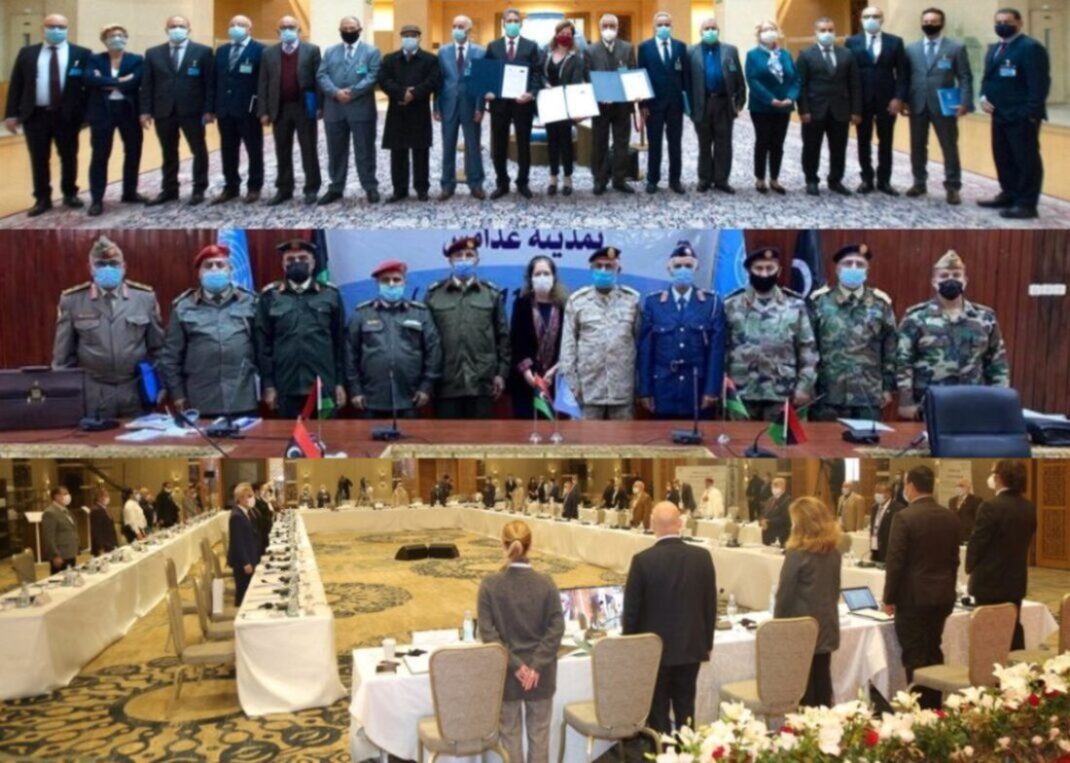By Abdullah Al-Kabir
 International influences cast a shadow over the political solution path, which is sponsored by by the United Nations mission.
International influences cast a shadow over the political solution path, which is sponsored by by the United Nations mission.
Despite some rapprochement between some effective countries in the conflict, such as Turkey and Egypt, their openness to their opponents in Libya, after Ankara received the envoy of Aqila Saleh, and the visit of an Egyptian diplomatic and intelligence delegation to Tripoli after a break of six years.
However, this convergence does not mean complete coordination and identical visions regarding the conflict situation and the means for a solution.
Cairo, after its conviction of the failure of Haftar’s project to tighten his grip on power by armed force, and the near handover of the new authority in America to the reins of power, and the changes that will occur with the administration of Biden, as well as promising economic opportunities in Libya.
This bold step was taken, moving far enough from the Abu Dhabi government, which through the speech of its media channels does not seem to be satisfied with this Egyptian turn towards the Libyan crisis.
The current Russian-Turkish rapprochement can be understood in the context of their apprehension about the American efforts to limit their growing influence related to the personalities and entities currently in power.
Therefore any attempt to overthrow them through the political dialogue forum will not be accepted by them.
Despite this blockage in achieving the basic goal of the Forum for Political Dialogue, the UN envoy Stephanie Williams announced the formation of a committee from the forum that includes 15 members and then increased it to 18 that includes all regions and directions with representation of women and youth.
That means bypassing the first proposal of mechanisms and searching for acceptable alternatives, this prompted Aqila Saleh to further regional mobilization through more than one meeting in the east, as he became aware that his path to ascending the Presidency Council to succeed Al-Sarraj became longer and more tortuous.
The dispute between him and Haftar have become more apparent, and the Egyptian efforts have not succeeded in containing them.
The removal of Aqila Saleh from the authority positions is an inevitable issue for those who seek consensus and gather the scattered parts of the country, as it is difficult for Saleh to play this role, because his narrow tribal awareness falls short of surrounding the country and presenting a comprehensive and balanced discourse, even by assuming the position of the presidency of the Libyan Parliament, his vision was limited to the scope of his tribe.
He finds himself only speaking about very dangerous national issues within the notables and elders of his tribe, while it is natural for those seeking the highest political position in the state to address all members of the people with all their components and directions.
In all her recent statements, the UN envoy did not stop reminding the exact date for the elections at the end of this year, and she is focusing with the Constitutional Committee to develop plans and proposals for the constitutional base for the elections.
As the blockage of the way to form a unified government pushes to pressure the election paper, she realizes that the majority do not want it.
Rather, the head of the Supreme Council of State went to the point of declaring that it could not be held before two years ago!
There is an option that was not clearly presented, but the failure of the members of the Forum pushed it to the surface, which is the survival of the current Presidential Council and the formation of a new, expanded government in which all parties participate.
It is an option faced by supporters of the power-sharing deal between active figures in power now.
In the last meeting between ambassadors of Western countries with Al-Sarraj, according to the statement issued by the American embassy, the ambassadors stressed the need to form a unified and strong authority before the elections, with full support for political dialogue as well as the military and economic tracks.
This position, with the UN envoy’s warning of a solution imposed on them from outside if they are unable to agree on the new authority, confirms the desire of Western countries to limit the influence of Turkey and Russia.
But the results of the Political Dialogue Forum will be supported by a decision of the Security Council, so can this decision be passed without approval of Russia?
Is it possible to impose any authority that the Forum creates on the divided parliament and the armed groups controlling the capital?
As for talking about Sirte as the seat of the government, contains several obstacles, the most important of which is preparing the city and expelling the mercenaries.
Recent events indicate Haftar’s consolidation of his authority in Sirte through a steering council, bribing people with some crumbs of fuel and foodstuffs, and rejecting the UN Secretary-General’s proposal to deploy international observers to monitor the ceasefire and the withdrawal of mercenaries and foreign fighters.
The next few days and weeks will reveal the next step after the formation of the new committee in the Political Dialogue Forum.
Will Stephanie succeed through what the committee proposes to overcome the dilemma of power, or will the current authorities remain east and west, and focus their efforts in what remains of their time on the legal committee?
Did the Arab revolutions fail?
This question is re-asked in each anniversary of the Arab revolutions. The question itself implies doubts about the feasibility of the revolution as long as it did not achieve its expectations.
By following the developments of the revolution in all countries, the direct answer is yes.
The revolutions failed because the situation got worse than it was in the Arab countries before the outbreak of the revolution in Tunisia and spreading later to other countries.
And large number of the Arab peoples is taking nostalgia to the pre-revolution time and the fall of some tyrannical regimes.
There is no problem in describing an event whose chapters have been completed with success or failure, but is it correct to ask this crucial question about an event that is still interacting, and its repercussions are continuous?
A student may fail and exhaust the repetition times in a given stage of study and be forced to leave and change course or specialization in pursuit of a new opportunity.
A sports team may fail to win the championship in a competition and the title goes to another team. Here we can talk about failure without a dispute, because the event was completed with failure for the student or the sports team. But an event that has not been completed is absolutely unfit for final judgments.
The Arab revolutions that opened the way to change are still waging their various struggles at all levels in all Arab countries, even those that remained untouched by the drizzle of its waves, and the regimes in them were forced to take measures to delay the explosion of protests by various means, such as amending the constitution, making some reforms, or using the surplus rentier revenues to improve people’s income levels.
There are many evidences for the continuation of the revolutionary movement despite all the pitfalls and failures, demonstrations demanding change continue without interruption in the countries of revolutions, and attention to public affairs has become at the core of the Arab citizen’s interest, and the ferocity of the remaining repressive regimes has increased and this is evidence of fear of a repeat of the explosion moment.
Perhaps the most prominent evidence of this continuous process of the revolution is the outbreak of protests in Sudan, Algeria, Iraq and Lebanon eight years after its first wave. And still the rest of the authoritarian regimes tremble in fear and panic as they carefully await the next waves.
So what happened? Why did the revolutions relapse? With Tunisia as an exception, Syria, Libya and Yemen slid into wars, and the military returned to power in Egypt.
The relapse of the Arab revolutions cannot be limited to one reason because many factors have combined to disrupt the process of change, some of them are related to the social and economic structures in the countries of the revolution, and some of them concern external interventions and conflicting regional and international projects, in arenas that have become exposed after the collapse of the ruling regimes and the weakness or absence of institutions capable of filling the void and confronting external interference.
There is a major reason that should be taken into account when talking about revolutions, as history tells us that the stages of change take a long time beyond expectations.
It has never been before people reaped the fruits of their sacrifices on the massacres of revolutions before decades after the revolutionary time. But man was created of haste and wants to see the effect of transformation as soon as possible.
There is no doubt about it that change has taken place, and that what is after 2011 is completely different from what came before it, as for the path of change and its acceleration or slow pace, it will remain dependent on all the conflict interactions between the new, which the dreams and aspirations of the people seek, and the tyrannical forces of the past that allied with the enemy to abort any resurgence that would change the power equations and end external hegemony over the Arab region.
***
Abdullah Al-Kabir, a Libyan writer
_____________





